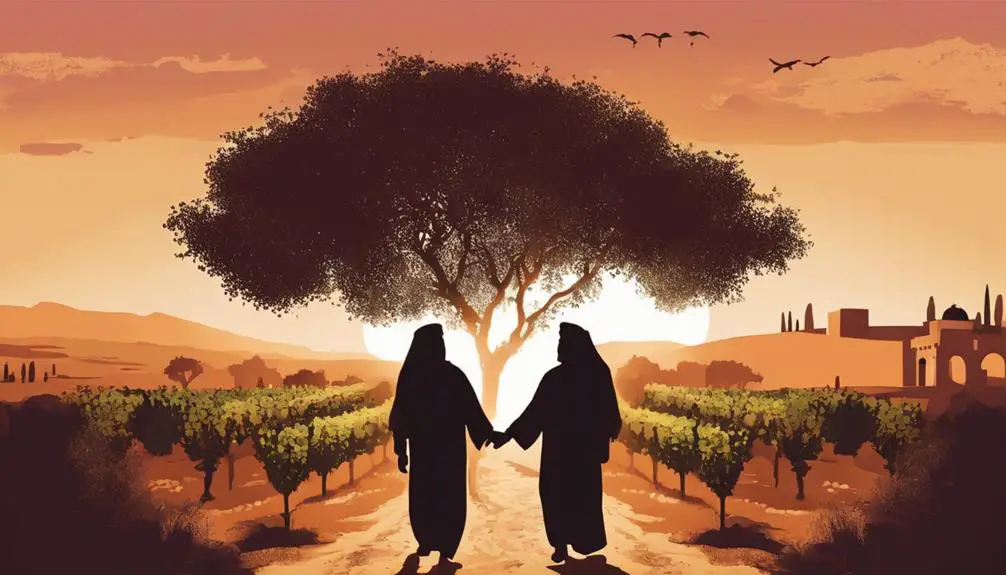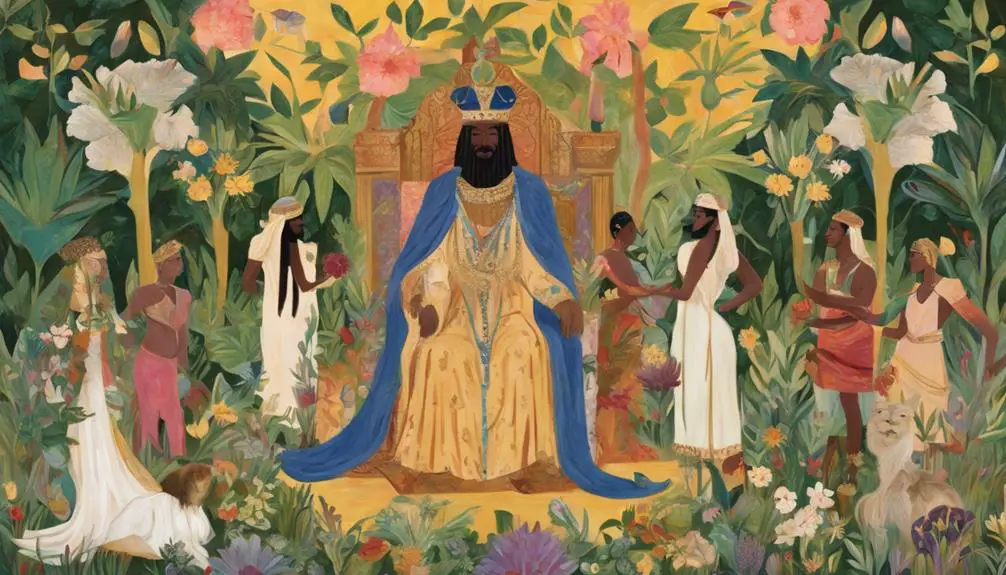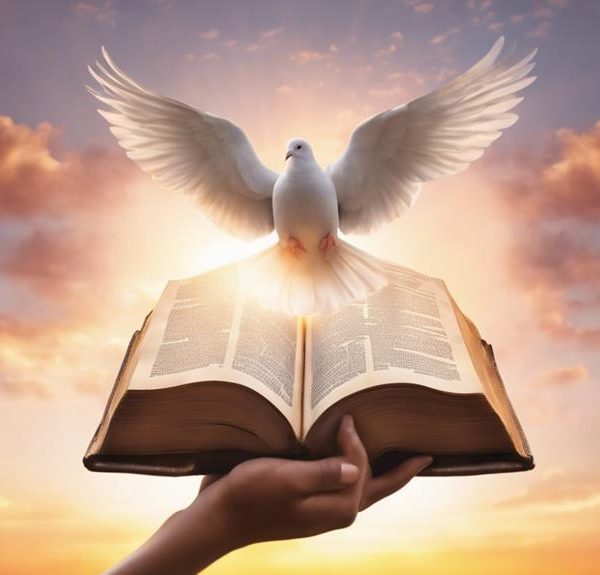Learn how love and betrayal intertwine in the Bible's most captivating stories of passion, offering timeless lessons for today's lovers.

Paramours in the Bible
In the pages of the Bible, you'll find tales of love, passion, and betrayal that rival any modern drama; from David and Bathsheba's clandestine affair to the tumultuous love story of Samson and Delilah. These narratives aren't just ancient history; they offer a mirror to our own relationships and moral dilemmas.
As you explore these biblical paramours, you'll discover that the themes of love, temptation, and redemption are as relevant today as they were thousands of years ago. What lessons can you take from these timeless stories to apply to your own life? The answer might surprise you.
Key Takeaways
- The Bible explores complex relationships, highlighting the consequences of desire, power, and betrayal.
- Divine narratives often symbolize broader themes of redemption, forgiveness, and the human condition.
- Biblical stories of love and temptation reveal vulnerabilities and moral dilemmas faced by individuals.
- Marital dynamics in the Bible reflect societal norms, personal desires, and divine interventions guiding human relationships.
David and Bathsheba's Affair

One of the most controversial stories within the biblical narrative is the affair between David and Bathsheba, showcasing a complex interplay of power, desire, and consequence. This royal scandal isn't merely a tale of adultery but an exposition of moral complexities that challenge the simplistic notions of right and wrong.
You're invited to dissect the layers of this narrative, considering the societal and personal ethics entangled within.
At the heart of this story, you find King David, a man after God's own heart, ensnared by his desires for Bathsheba, leading to a series of actions that would forever alter their lives. This episode reveals the vulnerability of even the most revered figures to the temptations of power and flesh. The affair, followed by the orchestrated death of Bathsheba's husband, Uriah, unfolds the moral ambiguities present in human nature and governance.
You're urged to ponder the implications of David's decisions, not only on his personal integrity but also on his rule over Israel.
This narrative serves as a critical examination of how power dynamics can distort moral judgment, urging a reflection on the ethical dilemmas faced by individuals in positions of authority. Through this lens, the story of David and Bathsheba transcends its historical context, offering timeless insights into the perennial struggle with moral complexities.
Samson and Delilah's Story
Moving from the complexities of David and Bathsheba's affair, we now turn our attention to another emblematic story of love and betrayal: that of Samson and Delilah. This narrative is a poignant exploration of strength's downfall and trust's breach, where personal vulnerabilities are exposed in the light of intimate relationships.
The tale of Samson and Delilah is not merely about physical strength; it's a study on the fragility of human trust. Delilah, possibly motivated by wealth and pressure from the Philistines, persistently questions Samson about the source of his strength. Despite initial resistance, Samson eventually succumbs, revealing the secret of his strength lies in his uncut hair, leading to his eventual capture and downfall.
Aspect |
Analysis |
|---|---|
Trust's Breach |
Delilah's manipulation exposes the vulnerability in Samson's trust. |
Strength's Downfall |
Samson's physical strength is rendered useless by emotional exploitation. |
Betrayal's Impact |
The story underlines how betrayal can lead to one's downfall. |
Love's Complexity |
It challenges the notion of love, intertwining it with deceit. |
Human Frailty |
Highlights the fragility of human strength when faced with emotional manipulation. |
This narrative prompts an introspective look into the dynamics of power, love, and betrayal, underscoring the complexity of human relationships and the consequences of trust's breach.
Solomon's Many Loves

King Solomon's narrative, with his numerous romantic entanglements, provides a rich tapestry for examining the intersection of love, leadership, and wisdom in biblical context. You find that Solomon's wisdom, renowned throughout the lands, seemingly falters when faced with matters of the heart. His political marriages, numbering in the hundreds, serve not only as alliances but also as a testament to his complex approach to love and power.
Analyzing Solomon's relationships, you notice a discernible pattern where his love life intertwines with idolatrous influences. These foreign wives lead him astray, introducing idol worship that contravenes the monotheistic essence of his kingdom. This aspect of his story offers a nuanced view of how Solomon's wisdom is challenged by his personal choices. Despite his unparalleled wisdom, his heart's inclinations towards his many wives dilute his devotion, leading to significant religious and political repercussions.
Methodically examining these dynamics, you understand that Solomon's narrative isn't merely about the quantity of his loves but the quality of his decisions. The idolatrous influences of his relationships mark a pivotal point in his reign, illustrating the complexity of balancing wisdom, love, and leadership in a way that resonates through ages.
Jacob, Rachel, and Leah
Shifting focus to another biblical narrative, we encounter the intricate story of Jacob, Rachel, and Leah, a tale that further explores the themes of love, deception, and familial duty within a sacred context. You witness Jacob's deep affection for Rachel, yet you're also introduced to Laban's deceit, as he substitutes Leah for Rachel on the wedding night, adhering to local marriage customs that favor the elder daughter's marriage first. This episode not only highlights the complexities of marital arrangements in ancient times but also sets the stage for an examination of the consequences of deceit and the resilience of love.
- Laban's Deceit: A pivotal moment that underlines the prevalence of deception within familial relationships and its long-term impact.
- Marriage Customs: An exploration of ancient marital practices, providing insight into the societal norms and expectations that shaped individual lives.
- Jacob's Love for Rachel: Despite the deception and subsequent marriage to Leah, Jacob's enduring love for Rachel remains a testament to the power of love amidst adversity.
- Familial Duty and Deception: The narrative delves into the tension between societal obligations and personal desires, illustrating the complex interplay of love, duty, and deception.
Analyzing this story, you're invited to reflect on the enduring themes of love, deception, and duty that resonate across time.
Hosea and Gomer's Relationship

In exploring Hosea and Gomer's relationship, we delve into a narrative that symbolizes the profound complexities of faithfulness and redemption within the framework of divine love. This story, rich in metaphorical depth, offers you a window into the essence of divine forgiveness and unconditional love, challenging us to understand love's boundless capacity to forgive.
Aspect |
Analysis |
|---|---|
Divine Love |
Unconditional love is central, mirroring God's love for His people despite their transgressions. |
Forgiveness |
The narrative emphasizes the importance of divine forgiveness, showcasing how Hosea's forgiveness towards Gomer reflects God's willingness to forgive our own failings. |
Faithfulness |
Hosea's unwavering commitment to Gomer, despite her unfaithfulness, serves as a poignant reminder of the steadfast nature of divine love. |
Redemption |
Gomer's return to Hosea, facilitated by his relentless love, symbolizes the redemptive power of love and forgiveness. |
Metaphor |
Their relationship acts as a metaphor for God's relationship with humanity, highlighting the themes of redemption and divine love. |
Through this analysis, it's clear that Hosea and Gomer's story transcends a mere historical account, embodying the quintessential example of unconditional love and divine forgiveness. This narrative encourages a deeper reflection on the nature of divine love and its implications for personal and collective redemption.
Frequently Asked Questions
How Did Societal Norms and Laws of the Time Address Extramarital Relationships or Affairs?
In historical contexts, societal norms and laws strictly addressed extramarital relationships or affairs. You'd find that divorce regulations were stringent, often heavily penalizing women. Punishment methods varied, from fines to, in extreme cases, death.
This legal framework aimed to preserve societal order and family integrity. Analysis shows that these measures reflected the values and moral codes of the time, methodically enforcing what was deemed acceptable behavior within marriages.
What Are the Psychological Motivations Behind the Characters Engaging in These Relationships, According to Biblical Scholars or Historical Context?
You're delving into the depths of desire, dissecting the dynamics driving individuals into intricate interactions.
Biblical scholars argue that character dynamics in these narratives often stem from a quest for power, love, or validation.
Emotional consequences are meticulously mapped out, showcasing how these relationships impact individuals' psyches and societal standings.
This analytical approach reveals the complex motivations behind seeking solace in another's embrace, beyond societal norms or divine decrees.
Are There Any Lesser-Known Paramours or Love Stories in the Bible That Share Similar Themes With the Ones Listed?
You're exploring themes of divine love and prophetic marriages without diving into well-known narratives, aiming to uncover hidden layers in less spotlighted stories.
By methodically analyzing these relationships, you'll find that even the lesser-known tales echo similar patterns of love and divine intervention seen in more prominent stories.
This analytical approach not only broadens your understanding but also enriches your perspective on love's portrayal throughout biblical history.
How Have Different Religious Denominations Interpreted the Moral Lessons From These Stories, Particularly Regarding Fidelity and Marriage?
You'll find that different religious denominations have diverse divine interpretations of these stories, especially concerning fidelity and marriage. They meticulously analyze the moral lessons, considering both scriptural contexts and cultural impacts.
This methodical approach helps bridge historical understandings with contemporary values. Thus, while exploring these narratives, it's clear that each denomination's perspective significantly influences how followers internalize and apply these teachings in their personal and communal lives.
In What Ways Have These Biblical Stories of Love and Betrayal Influenced Modern Literature, Art, or Cultural Norms Around Relationships?
You've likely noticed how cinematic adaptations and love idioms pepper modern storytelling, drawing deeply from ancient narratives.
These tales, while not explicitly biblical, echo themes of love and betrayal that have shaped our cultural norms around relationships.
Analyzing this influence reveals a rich tapestry of literary and artistic inspiration, where the echoes of past stories imbue contemporary works with a timeless resonance, guiding societal perceptions of fidelity and romance.
Conclusion
As you've journeyed through the tangled webs of love and betrayal woven into the biblical narratives, it's clear that the heart's complexities are timeless. Consider the story of David and Bathsheba—a tale that mirrors a moth drawn to a flame, illuminating the perilous dance between desire and duty.
This account, among others, serves as a poignant reminder that the struggles of the heart aren't mere relics of the past but enduring facets of the human condition.



Sign up